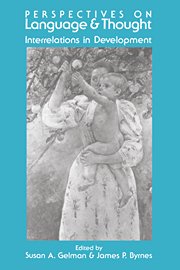Book contents
- Frontmatter
- Contents
- Preface
- List of contributors
- I INTRODUCTION
- II RELATIONS BETWEEN WORD LEARNING AND CATEGORIZATION
- III LOGICAL, CAUSAL, AND TEMPORAL EXPRESSIONS
- IV THE ROLE OF SOCIAL INTERACTION
- 11 The language of thinking: Metacognitive and conditional words
- 12 Parent–child collaboration in young children's understanding of category hierarchies
- 13 Beginning to talk with peers: The roles of setting and knowledge
- Author index
- Subject index
12 - Parent–child collaboration in young children's understanding of category hierarchies
Published online by Cambridge University Press: 05 January 2012
- Frontmatter
- Contents
- Preface
- List of contributors
- I INTRODUCTION
- II RELATIONS BETWEEN WORD LEARNING AND CATEGORIZATION
- III LOGICAL, CAUSAL, AND TEMPORAL EXPRESSIONS
- IV THE ROLE OF SOCIAL INTERACTION
- 11 The language of thinking: Metacognitive and conditional words
- 12 Parent–child collaboration in young children's understanding of category hierarchies
- 13 Beginning to talk with peers: The roles of setting and knowledge
- Author index
- Subject index
Summary
Current views of conceptual development assume that children actively construct mental categories. In this sense, the field owes much to the insight of Piaget. Although many researchers in the field of cognitive development have rejected Piaget's claims about qualitative stage changes in development, we almost take for granted his insight about children's active role in organizing and interpreting their experiences. Within the field, there is another growing trend toward considering the construction of knowledge not just as a pursuit of the individual, but as a social process. Much of this work has been inspired by Vygotsky's ideas. Piaget's and Vygotsky's approaches may seem at first to be at odds with one another, but in fact they are quite complementary. By combining these two approaches we may better understand the interaction between (a) children's expectations about category structure and word meaning and (b) the way that parents use language to structure the world for young children. Considerable attention is now focused on a third approach, which emphasizes not only the separate roles of parents and children, but also the convergence process by which parents and children construct shared meanings for words and concepts.
The notion that language is situated within social interaction and that conversational partners converge on the meanings of words within conversation has its roots in Vygotsky's (1962, 1978) work and has been elaborated recently in Rogoff (1990), Bruner (1984, 1987), H. Clark (1985), and others (see Bruner & Haste, 1987). Vygotsky (1962, 1978) described cognitive development as a process of internalizing patterns of social interaction (see Wertsch & Stone, 1985).
- Type
- Chapter
- Information
- Perspectives on Language and ThoughtInterrelations in Development, pp. 440 - 484Publisher: Cambridge University PressPrint publication year: 1991
- 15
- Cited by

